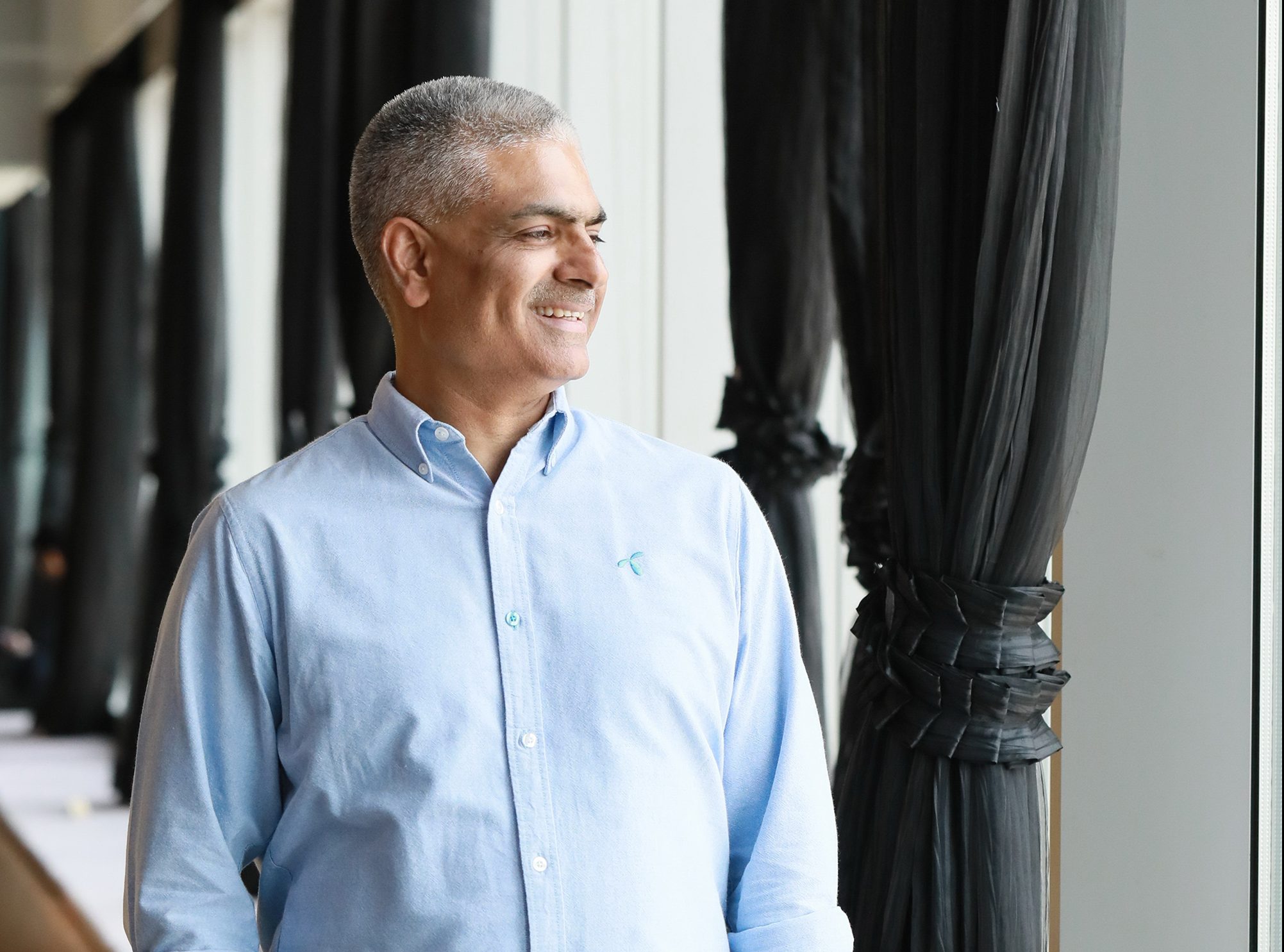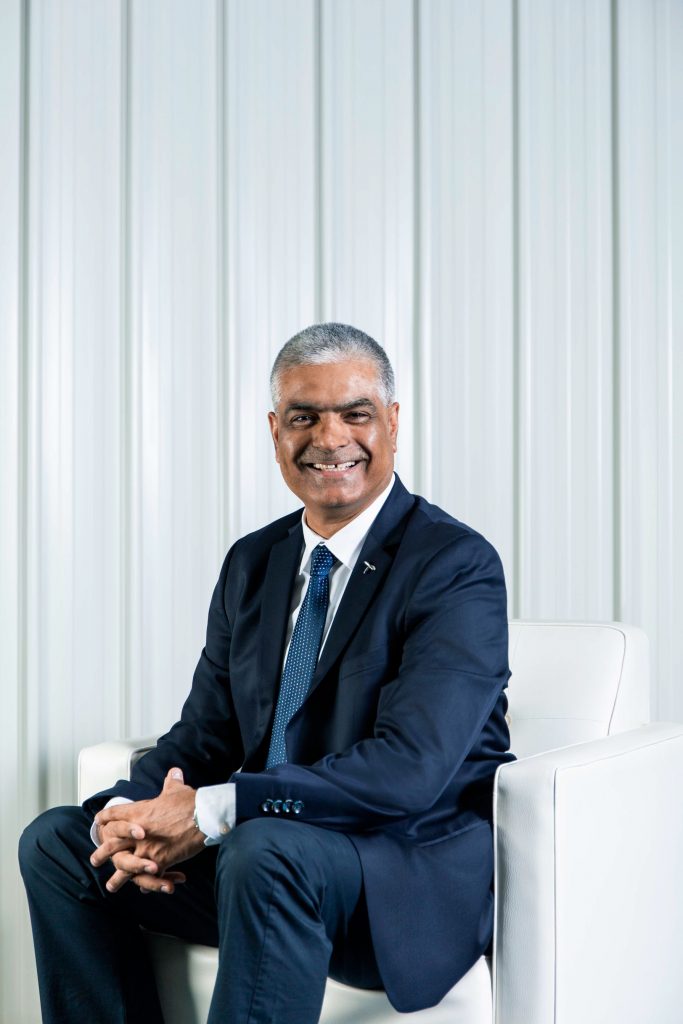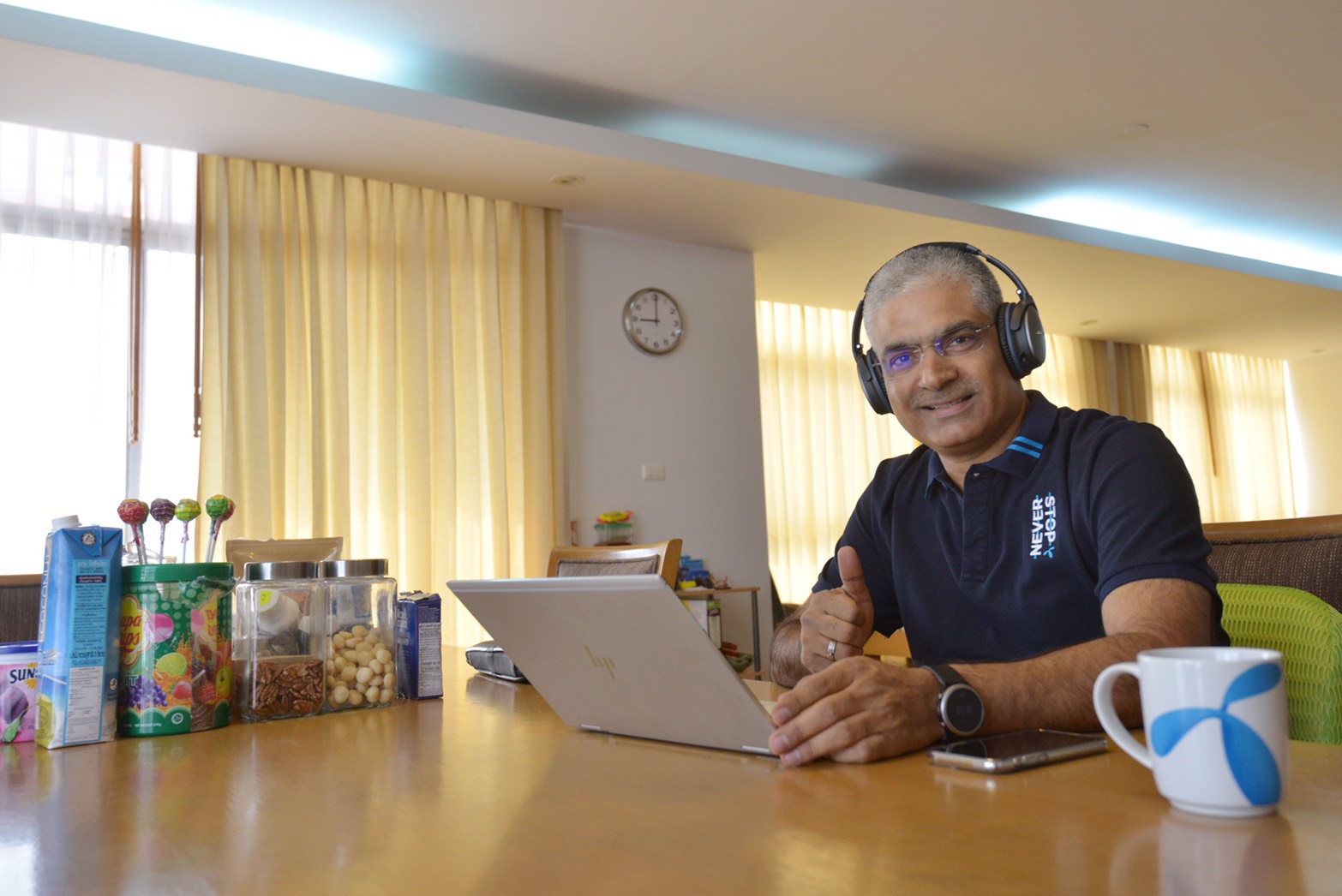At a time when connectivity is paramount, he’s going full speed ahead.
By Aiden Jewelle Gonzales
“With the advent of COVID-19, it’s become very clear how important mobile connectivity is in ensuring resilience in the community,” Sharad Mehrotra, the CEO of DTAC, one of Thailand’s largest mobile GSM providers, tells me. “It’s important not just for the country’s economy, but also in emergency services, healthcare, and other areas where communication is key.”
Born and raised in Kanpur, Uttar Pradesh, Sharad took the helm of DTAC in February 2020, just as the pandemic was ramping up around the world, but he hasn’t let that faze his enthusiasm for the possibilities of digital transformation. “What attracted me to the telecom industry is how it connects people, in very different countries,” he says. “Focusing on consumer feedback and behaviour, and adjusting accordingly, helps us to allow consumers to connect with what matters most to them, which is what I enjoy most. Consumers are what remain at the core of connectivity and communication.”
Despite decades of experience in the industry, starting with reputable brands Ericsson and Aircel, and then in numerous management positions within DTAC’s parent company and global telecom giant, Telenor, Sharad remains grateful for the opportunities he’s been afforded along the way. “I got my communication engineering degree from what was then the University of Pune before doing my MBA in The Indira Gandhi National Open University (IGNOU),” he recalls. “Before coming to Thailand as the CEO of DTAC, I was the CEO of Telenor in India (now merged with Bharti Airtel) and then in Myanmar, and prior to that in 2013, I was Telenor’s Head of Distribution in Asia, based out of Bangkok. During that time, I was given the responsibility of CMO in Myanmar, where we started a green-field investment.”
This investment, which saw them build operations in the country from the ground up, is to this day an accomplishment that Sharad looks back on with pride: “We had to set up a mobile phone ecosystem when there was nothing there – not the brand, nor the understanding, nor the distribution. Developing the mobile network and creating millions of mobile subscribers was a very enriching experience that I’m still thankful for.” Throughout his experiences in different geographies, however, Sharad reveals that it’s his connections with the people there that continue to motivate him. “People are people no matter which location you’re at,” he says. “The culture may be different, but they all have similar aspirations. I’m quite passionate about looking after the talented people under my care, and learning from, and bettering myself through, their stories. This is the most integral part of my career journey of three decades, and I still love it.”
He holds a special place, however, for Thailand’s unique prospects, both personally and professionally. Although he was initially based out of Bangkok for only a few months back in 2013, his family’s “love for Thailand was so strong that we decided not to move,” he reveals. The entire ecosystem is one that we love so much that now, 70 percent of the time, we only eat Thai food,” he continues with a laugh. “At the same time, for the telecom industry, there’s a very different dynamic in the way that mobile communications are done here. Mobile users in Thailand are very savvy about how they want to embrace these services. Here in Thailand, we’ve got high smartphone penetration, of about 89 percent, and high data usage, of about 23GB per subscriber per month, several times higher than even most European countries.”
He views these statistics, however, as opportunities couched in difficulty: “While the high usage is challenging from a network perspective, it’s also encouraged us to find ways to continuously improve network performance. We’ve now implemented two sites per hour on a 700 MHz band, a very demanding band that provides large coverage, with great speed, and that can penetrate rural areas and inside buildings. On the other hand, Thailand’s high smartphone penetration helps us accelerate our digital transformation journey, enabling our users to do things faster and have high engagement.” And in the end, he tells me, it’s paid off. “What we’re seeing is that our network promoter score, what we measure to enhance our network, has continued to rise in the last couple of months.”
Sharad’s – and by extension, DTAC’s – determination to find opportunities in complexity was further put to the test during the global pandemic, but, Sharad tells me, his team had risen to the challenge admirably. “DTAC as a company is very inspiring,” he says, impassioned, “we connect over 19 million customers, at a very difficult time when those connections are so critical. We’re currently going through a digital transformation that is further accelerated by our learnings from COVID-19, as we took this as an opportunity to learn as many changes as we can in consumer behaviour, and how DTAC can enhance our services and solutions in a way that is in line with customer expectations.”
What’s more important, he tells me, is that these solutions are provided to everyone in the country, not just a select few. “We aim to bridge the digital gap not just in the cities, but in rural areas as well. We’ve launched 5G services in many areas because our mission is high-speed for all, so that everyone can benefit – what we want is to empower everyone nationwide.”
Part of the ways they do this, Sharad tells me, is DTAC’s mission to be a company for the Thai masses, not just the elites. “We’re enhancing our online channels, and offering a lot of new end-to-end digital services, all accessible through the DTAC app,” he explains. “There you can find flexi-plans, or quit your tariffs early, or choose your own add-ons like COVID insurance or a one-year screen insurance for your device. You can even select lucky numbers in a very flexible and personalised way; we’ve spent a lot of time and energy to come up with lucky numbers best suited for each individual because we know that’s important for a lot of our Thai customers.
“Moreover, for our B2B and business customers, we have very flexible packages, where you can increase or decrease limits without paying any penalties. We also provide what we call our Jaidee borrow service, which is pre-paid credit if people run out of money, and we have a lot of fun and engagement built around it. It’s all about creating that sanook feeling for our customers,” he says with a smile.
At the same time, Sharad emphasises, the safety of his team and customers is paramount for him and his management team, especially during these times. “We’ve been very careful to ensure that all our employees who can work from home can do so, and that our shops are as safe as possible for our consumers. It’s a big responsibility to make sure that we meet all the highest safety standards, but also serve all our customers in the ways they need during this pandemic.”
In fact, he says, he and the DTAC management team have come up with entirely new ways to work in order to pivot during the last year. “We’ve created what we call a Tight Loose Tight concept. Tight, because we have to set the right targets, loose, because we want to empower our leaders to choose to execute those targets in the way they want, and tight again because we’re strict about measuring the impact of our KPIs. We did this because we’ve realised that the people closest to our customers must be empowered to make their own decisions so that they can work fast, act fast, and execute fast. It’s my personal belief that it is not the big that beats the small, it’s the fast that has the edge over the slow. So we inspire and coach our people on the go.”
However, through the last year and a half’s focus on automation and working online, Sharad hasn’t forgotten the core of why he does what he does: the human element. “While we have been working on a lot of automation in the company – robotics, artificial intelligence, serving customers with a lot of analytic-driven offerings – the human element is at the centre of everything. Our HR department is working hand- in-hand with our team to see how to best navigate the situation, to see that they are all safe, motivated, and engaged. We do that through a very Agile-centric, empowering environment, with elements of fun to keep things light – yoga, team activities, online games.”
That focus on empowerment has recently borne fruit in ground-breaking policies that DTAC has spearheaded, including parental leave for both parents, and policies directed towards the LGBTQ+ community, such as time off for gender reassignment surgery. When I ask Sharad about being at the vanguard of forward-thinking businesses, he is adamant about the importance of promoting basic human rights. “Here at DTAC, we’re committed to responsible business, and part of that is respecting the human rights of our employees. At work, everyone deserves to feel safe, and to feel respected. Promoting diversity at our workplace is not only very good for business, but for us as human beings. Numerous studies have proven that diverse businesses outperform those with a homogeneous workforce. With digital transformation, we need creativity, empathy, and a lot of collaboration, and this can only happen in a workforce that respects diversity.” Sharad adds with a smile, “We call DTAC a love brand – we want to connect with what’s important to people, and there are so many human angles that play an important role.”
I point out that part of responsible business is embracing sustainability, and it’s clear that this is an area that Sharad also takes very seriously. “We at DTAC are committed to cutting our greenhouse gas emissions in half by 2030,” he tells me. “It’s a very ambitious goal, but we believe that climate change will be a greater threat in the next 10 years, than say, another pandemic.” He also weighs in on an issue that’s been part of the digital transformation discourse for years: data privacy. “It’s an important focus for us,” he says. “We’ve been following the European GDPR requirements and we’ve put in place very strong controls to ensure our customer’s safety and privacy are as high as possible. We have a very high commitment to sustainability and compliance while we do business as a good corporate citizen.”
As for his own personal experience of being a good corporate citizen, Sharad is very forthcoming about how much he is continuously learning: “One thing that’s very important as you embark on your journey as a leader is, how do you create trust among employees? It starts from respect. You respect what people are doing; you allow them to make mistakes, because failures make bigger things. The earlier you fail, the more you scale fast. Respect and trust are both interlinked. In the end, it comes down to four behaviours, which we hold in high regard at DTAC: to always explore, collaborate more, keep promises, and be respectful. In the end, that’s all we need to keep us happy and passionate about what we do.”









